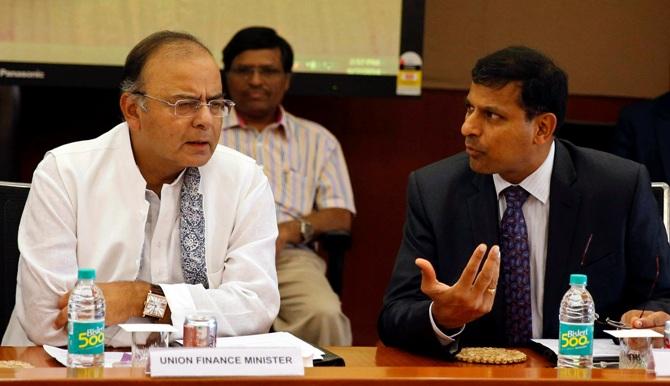 | « Back to article | Print this article |
Why tax cuts will be key focus in Jaitley's maiden Budget
It is important for the finance minister not to impose on his tax collection team a revenue target that is unrealistic.
Finance Minister Arun Jaitley may or may not like it, but his first Budget, to be presented for 2014-15 next month, will inevitably be compared with what his predecessor, Palaniappan Chidambaram, did in his interim Budget for the current fiscal year.
The key numbers in Mr Jaitley’s Budget will be looked at closely to assess the extent of revisions they represent over what Mr Chidambaram had presented in February.
However, this may not be a disadvantage for Mr Jaitley. Indeed, at a purely political level, this could be an opportunity for him to show how far removed from reality were his predecessor’s assessment and forecast of key budgetary numbers.
Mr Chidambaram may, of course, argue that the economic ground reality that prevailed at the time of presenting the interim Budget changed significantly by the time Mr Jaitley began preparing the full Budget for the year.
Nevertheless, there is little doubt that Mr Jaitley’s Budget numbers will throw fresh perspectives on the numbers of his predecessor.
Click NEXT to read more...
Why tax cuts will be key focus in Jaitley's maiden Budget
Take, for instance, the fiscal deficit projection of 4.1 per cent of gross domestic product, or GDP, made by Mr Chidambaram in his interim Budget.
This was largely premised on robust revenue growth estimates. How ambitious was Mr Chidambaram?
An economy that was projected to record nominal growth of about 13 per cent in 2014-15 was expected to generate an increase of 19 per cent in the government’s gross tax revenue. That was quite a tall task.
Compare this projection with what actually happened last year (2013-14).
While the Indian economy recorded nominal growth of 13 per cent, the government’s gross tax revenue grew by about 12 per cent over the actual collections in 2012-13.
So a 19 per cent increase in gross tax collections would remain a mirage unless the Indian economy sees a spurt in its pace of growth or a significant improvement in tax buoyancy along with its coverage.
Click NEXT to read more...
Why tax cuts will be key focus in Jaitley's maiden Budget
Indeed, for collections under almost all of the principal taxes, the interim Budget’s projections were too optimistic to be true.
Corporation tax was to rise by 15 per cent, while last year it grew by 10 per cent. Individual income tax collections last year grew by 20 per cent, but the interim Budget projected that growth in the current year at 27 per cent. Customs revenue last year increased by six per cent and the interim Budget projections more than doubled its growth at 15 per cent.
Excise duties, believe it or not, were projected to grow by 12 per cent in 2014-15, but in 2013-14 they actually increased by only two per cent.
Services tax too was to grow by 31 per cent, compared to the actual growth of 24 per cent last year.
So if Mr Jaitley were to build on the premise of a fiscal deficit of 4.1 per cent of GDP, would he be wise to rely on the interim Budget’s revenue projections? Not really.
Since tax collections account for almost two-thirds of the government’s total revenues, Mr Jaitley would do well to review the practical aspects of achieving the numbers in the interim Budget and which some of the finance ministry officials may still believe are achievable.
The finance minister, therefore, should pay heed to the recommendations his office has received from his predecessor’s advisor, Parthasarathi Shome, on how tax revenue targets should never be allowed to guide and influence tax administration.
He should also be forewarned that worse consequences may follow if the targets are set unrealistically, as it seems to have been done in the interim Budget, and the tax administration team is under pressure to deliver on those numbers before the end of the year.
Click NEXT to read more...
Why tax cuts will be key focus in Jaitley's maiden Budget
The election manifesto of the Bharatiya Janata Party, or BJP, had promised to put an end to what it called “tax terrorism”, unleashed by the previous regime.
Subsequent to the formation of the BJP-led government last month, the same promise was repeated when the president in his address at the joint session of Parliament said that the tax policy would be made non-adversarial.
One of the root causes of this “tax terrorism” is the excessive demands often made by the taxman on companies and individuals to cough up more taxes to help him meet the revenue collection target for the year, with the promise that the extra money thus collected would be refunded in the following year.
Click NEXT to read more...
Why tax cuts will be key focus in Jaitley's maiden Budget
Such demands have to come to an end if “tax terrorism” has to be rooted out or the tax policy has to be non-adversarial with the taxpayer.
One instance when such demands are made, Mr Jaitley must have realised by now, is if the Budget comes out with a revenue collection target that has no connection to the underlying growth assumptions for the economy and, therefore, looks unrealistic.
While it is important to reform and restructure the revenue department in the finance ministry, it is perhaps more critical for the finance minister not to impose on his tax collection team a revenue target that is unrealistic and can spawn harmful collection practices that give rise to “tax terrorism”, even though it might help him achieve a lower fiscal deficit number.
The price the economy has to pay for such excesses is much more than the temporary goodwill the finance minister may earn by showing a lower fiscal deficit number.





